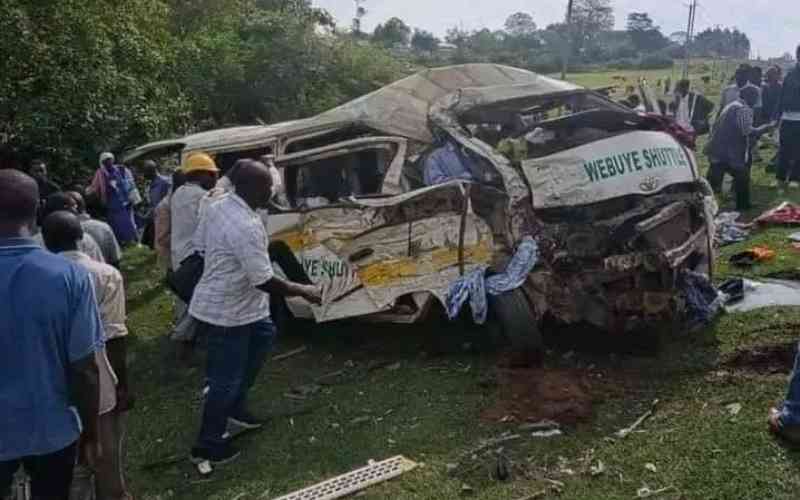By Jeckonia Otieno
Gun shots rang out on Tom Mboya Street shattering the morning peace. Then followed screams as pedestrians scrambled for safety.
After the dust had settled, two women lay bleeding on the asphalt, shot dead by police as they attempted to steal a side mirror from a car that was stuck in the traffic jam.
The theft of side mirrors, wheel caps, wind visors and car lights have become commonplace. Recently, the Nairobi County Police Commander, Benson Kibui, set up a 150-member team of undercover police officers to deal with this menace. This action has elicited a sigh of relief in many quarters because today, there are some roads that motorists venture into at their peril.
Peter Mwangi says he has lost two side mirrors in broad daylight to vicious thieves carrying knives and firearms.
Mwangi has felt the helplessness of hundreds of thousands of motorists, many who now disfigure their vehicle by securing their side mirrors with chains and using rivets to protect their wind visors by the windows.
Thieves mostly target cars manufactured in Japan for their accessories which they sell as spare parts to repair dealers, says Mwangi.
“It is quite rare to see a mirror secured to a Mercedes Benz or a Jaguar perhaps because the spares of these cars do not have a ready markert,” says Mwangi.
Police say spare parts thefts are most common along the Globe Cinema roundabout in Nairobi’s CBD. Juja Road, Outering Road, Machakos Country Bus Station and the Githurai roundabout are also unsafe and rising crime has prompted the police to act.
“We want to clean this city completely. We will arrest and take the criminals to court, but if any of them is armed and defies orders to surrender, my officers are under instructions to shoot,” said Kibui while announcing the existence of the undercover squad.
He says some of the criminals are armed and dangerous and so officers have had to respond by using force. Most robbers target women who they view as harmless and helpless.
With the perennial traffic jams in Nairobi, drivers are forced to keep their windows closed, even when it is steaming outside.
“If you don’t roll up your windows, you are likely to lose your valuables from marauding thieves, yet when you lock yourself inside the car, you are still likely to lose your side mirrors or wheel caps,” says Fred Ndolo, whose side mirror was stolen along the Machakos Country Bus Station.
The criminals are emboldened by the weapons they have. A report by the Security Research and Information Centre points to an increase in illegal firearms in the country. The report states that in just 10 months, police were able to recover 128 rifles, 60 pistols, 10 toy pistols and 36,458 rounds of ammunition in regular police operations.
These excluded the 1,064 firearms and 3,078 rounds of ammunitions recovered from a disarmament operation in the same period. In 2011, 368 firearms and 16,388 rounds of ammunition were recovered, the Kenya National Bureau of Statistics (KNBS) says.
Stay informed. Subscribe to our newsletter
This probably means that more firearms are in the wrong hands remotely translating into why even petty thieves are armed to the teeth.
The report lists the crime hotspots in Nairobi’s Dagoretti area, particularly Sokomjinga, Muslim, Stage 2, Magethodia and Waithaka kwa Ng’ang’a. In the Zion area of Dagoretti, criminals with guns pretend to be members of street families who roam the alleys.
In Starehe, areas such as Ngara, Kariakor, Mlango Kubwa, No. 10, Huruma, Kiamaiko and Mathare have been identified as crime hot spots. Juja Road, a few metres from the Mathare slums, is notorious for snatch thefts mainly when traffic is heavy.
At the Oil Libya area along the same road, petty thefts are common during the day but these crimes escalate to robberies when night falls. Rape is rampant in Mathare and Kosovo, while drug peddlers roam the streets in Huruma.
Two out of three people who spoke to the researchers believe the rate of crime has risen contrary to records by police, which indicate that the crime rate declined by 10 per cent. Statistics released by Inspector General David Kimaiyo showed that the crime level has generally gone down by 10 per cent, with 30,285 incidents reported since January as compared to 33,538 incidents reported in the same period last year.
Data on crime released in previous years shows that vice peaks during the months of December, April and August. These are the months when most schools are closed and precede the period when school fees are required.
The rise in theft of motor vehicle accessories has correspondingly risen with the number of registered vehicles. About 205,841 new vehicles were registered in 2011 compared to 196,456 in 2010. This increase comes with a need for spare parts whose prices have risen significantly. Observers say saloon cars from Japan are targeted for theft because they have flooded the market and, therefore, provide a ready source for spare parts.
The rate of crime is not going to fall soon, going by trends reported by various researchers. To compound the problem, the high penalties for theft have not deterred crime. Nairobi lawyer Lucas Kang’oli says that if a buyer is caught with a stolen side mirror, regardless of whether or not the person stole it, the buyer can be charged with theft as well as handling stolen property.
“It does not matter whether you are just an innocent buyer. You will be forced to prove your innocence in a court of law,” says Kang’oli.
Kang’oli has free legal advice for motorists — buy spare parts from accredited dealers. Buyers should be particularly careful when these parts are marked.
“Thugs either erase the numbers marked on side mirrors or break the areas that have been marked to make identification difficult,” says Kang’oli.
When mirror thieves are arrested, this tampering makes it almost impossible for vehicle owners to identify their parts raising the burden of proof — this abets the crime.
Experts suggest that the growing number of second-hand spares shops could be promoting the theft of spares.
Often, spares of vehicles that have been involved in accidents are resold at a lower price which has given a leeway to dealers to hire thieves to steal.
According to the national motor vehicle used spare parts code of practice, newly-purchased spares should not be mangled, torn, creased, cracked or deformed in any manner? They should also not be corroded. The standards also demand that?mirrors should be of convex type and reflecting surface not deteriorated or broken.
 The Standard Group Plc is a
multi-media organization with investments in media platforms spanning newspaper
print operations, television, radio broadcasting, digital and online services. The
Standard Group is recognized as a leading multi-media house in Kenya with a key
influence in matters of national and international interest.
The Standard Group Plc is a
multi-media organization with investments in media platforms spanning newspaper
print operations, television, radio broadcasting, digital and online services. The
Standard Group is recognized as a leading multi-media house in Kenya with a key
influence in matters of national and international interest.
 The Standard Group Plc is a
multi-media organization with investments in media platforms spanning newspaper
print operations, television, radio broadcasting, digital and online services. The
Standard Group is recognized as a leading multi-media house in Kenya with a key
influence in matters of national and international interest.
The Standard Group Plc is a
multi-media organization with investments in media platforms spanning newspaper
print operations, television, radio broadcasting, digital and online services. The
Standard Group is recognized as a leading multi-media house in Kenya with a key
influence in matters of national and international interest.








